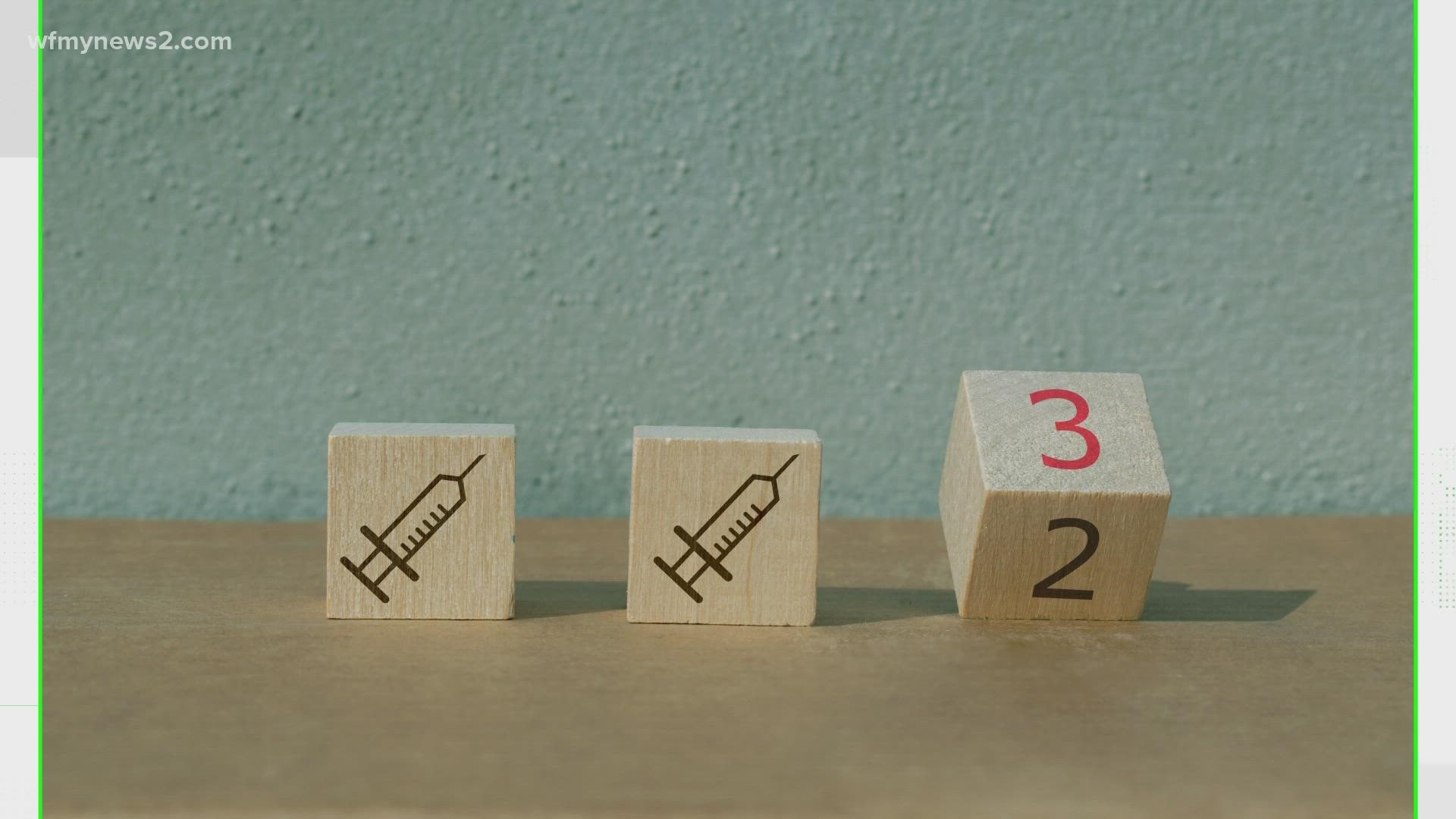GREENSBORO, N.C. — There are COVID-19 vaccines, vaccine third doses and vaccine boosters -- some are approved, others are not approved, and only certain age groups are eligible for certain shots.
Is your mind spinning trying to keep all of this information straight?
THE QUESTION
Viewer Bob Smith e-mailed the VERIFY team asking, "So why are we waiting for FDA approval (for COVID boosters) when I can go to CVS and get a third dose now? The 'booster' has to have something different? It makes no sense."
So, is there a difference between a third dose and a booster?
THE SOURCES
- Food and Drug Administration (FDA)
- Johns Hopkins University
- Chris Ohl, MD - infectious diseases, Atrium Health Wake Forest Baptist
THE ANSWER
Yes, there is a difference between a third dose and a booster, but only in terminology and based on who is receiving the shot. The shots, themselves, are no different from their original doses.
WHAT WE FOUND
Infectious diseases physician Chris Ohl, MD, explained, "Getting a third shot means getting a vaccine that was totally expected to have been needed in the series."
He used the Hepatitis B shot as an example.
"It (Hep. B vaccine) is a three-shot series. It has been since the 1980s. You get one at zero, one month and six months. And, that's what you need to provide the full immunologic protection. So, that's what we're doing (with the COVID vaccine) for our immunocompromised people. They don't respond to vaccines as well, and they need the full three-shot series," he said.
Back on August 12, the FDA authorized third doses of MRNA shots (Pfizer and Moderna) for age-eligible people with compromised immune systems. Dr. Ohl and Johns Hopkins University researchers explain people with compromised immune systems don't build up a strong response to the initial COVID-19 vaccines, and a third dose can help. That's why that group now can get a third dose of an MRNA shot at least 28 days after their second dose to complete a three-dose series.
RELATED: North Carolina officials approve third dose of COVID-19 vaccine for immunocompromised people
As for COVID boosters, the FDA authorized them Sept. 22, but only for Pfizer recipients. They're available to anyone 65 and older, plus anyone 18 and older with medical conditions (like pregnancy, diabetes) or jobs (health care, grocery) that put them at higher risk of getting sick.
The FDA says those groups must wait at least six months after their second doses to get the booster, because unlike people with compromised immune systems, they don't necessarily need an extra vaccine until the initial series wanes over time.
With regard to what's in the shots, there is no difference between a third dose and a booster. The manufacturers haven't yet modified them for the variants. So, what you're getting is what you've already had -- you're just getting more of it to protect against serious illness, hospitalization and death from COVID-19.
"It's the same shot. In our world of infectious diseases, we started calling it the 'ancestral vaccine.' I think coming down the road, in the future, there will be some tweaks to the vaccine, but we're months from that," Ohl explained.
WHAT WE CONCLUDED
In conclusion, yes -- there is a definition difference between third dose and booster, but really, it's mostly semantics. People with compromised immune systems can get third doses. People without compromised immune systems -- but whose age, medical condition and profession put them at risk -- can get boosters. Yet, third doses and boosters are identical to their original doses in ingredients and strength.
And, keep this in mind. At this point, the FDA has authorized only Pfizer and Moderna for third doses and only Pfizer for boosters for eligible groups, though Moderna and Johnson & Johnson are asking the FDA for emergency authorization for boosters, too.
Right now, the agency is not recommending mixing and matching shots. So, as you wait for guidance, consult your doctor with questions and concerns.
RELATED: No, health agencies aren’t recommending supplemental MRNA dose for Johnson & Johnson recipients
Do you have a question you want verified? Submit a post, screen shot or selfie video to Meghann Mollerus via:
Facebook: Meghann Mollerus News
E-mail: VERIFY@wfmy.com
Twitter: @MeghannMollerus

